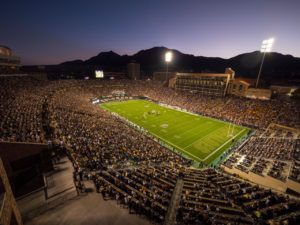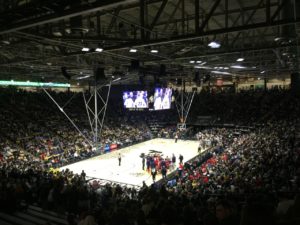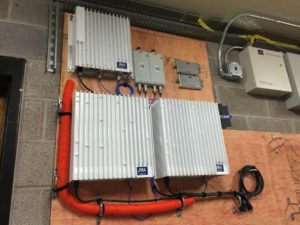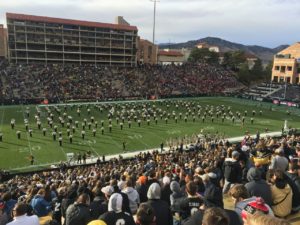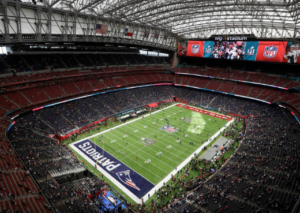In a deal that will also bring Wi-Fi and a cellular DAS to the school’s basketball arena, NCN will use Cisco gear for the Wi-Fi network and JMA Wireless gear for the cellular networks. A centrally located head-end will serve both venues via fiber connections, some run through existing tunnels from the campus’ old steam-heating infrastructure.
Due to be live (UPDATE: Now CU says the networks will not be operational until later this fall) before the 2019 football season begins on Sept. 7 when CU hosts Nebraska, later this fall, the Wi-Fi network will use 550 APs in a mostly under-seat deployment at Folsom Field, where there are no overhangs over any of the seating areas. DAS deployment in Colorado’s historic football stadium — which first hosted games in 1924 — will use antennas pointing down from the stadium’s top edges, with some new flagpoles scheduled to help provide antenna-mounting locations.
While its incredibly picturesque location at the edge of the Rocky Mountains has historically made Folsom Field a fan-favorite place to visit (at least for photos), the lack of any comprehensive wireless coverage of any sort has produced some grumbling from Buffs fans in recent years. According to Matt Biggers, CU’s chief marketing officer and associate athletic director for external affairs, wireless coverage inside the sports venues has been a topic of internal research for more than 6 years.
“It was all about finding a partner and a financial model that works for us,” said Biggers. “It finally got to a point where it made sense to pull the trigger.”
Neutral host model appealing to schools
Editor’s note: This report is from our latest STADIUM TECH REPORT, an in-depth look at successful deployments of stadium technology. Included with this report is a profile of the Wi-Fi records set at Super Bowl 53, as well as a profile of Wi-Fi at Vivint Smart Home Arena in Salt Lake City! DOWNLOAD YOUR FREE COPY now!
The model brought to CU is a classic neutral-host operation, where a provider like NCN (which bought the former sports-stadium practice from 5 Bars) will build a school’s Wi-Fi and DAS networks under a revenue-sharing deal with the school where the carriers help some with upfront payments and then provide payments over a long-term lease to operate on the DAS.The neutral-host option is one good way for schools or teams with smaller budgets or lightly used facilities to bring connectivity to arenas. CU’s Folsom Field, for example, doesn’t see much use other than the six home games per football season. This year, the stadium will see big crowds beyond football only at a few events, including the Memorial Day Bolder Boulder 10K footrace (which ends inside the stadium), a Fourth of July fireworks celebration, and a couple of July concerts featuring the Dead & Company tour.
According to James Smith, vice president of carrier services for NCN, AT&T will be the anchor tenant on the DAS, and will be first to be operational. Verizon Wireless and T-Mobile, Smith said, are still negotiating long-term agreements but are expected to be on the DAS by 2020.
NCN [then under its old name of 5 Bars] negotiated a similar neutral-host deal with CU’s neighbor to the north, Colorado State University, for CSU’s new football stadium which opened in 2017. Now known as Canvas Stadium, the 41,000-seat venue had 419 total Wi-Fi access points when it opened, with approximately 250 of those used in the bowl seating area. Like CSU’s deployment, the Wi-Fi network at Folsom Field will use primarily under-seat AP deployments, mainly because the stadium’s horseshoe layout has no overhangs.
According to NCN’s Smith, the current plan sees a deployment of 550 APs in Folsom Field, with another 70 APs in the basketball arena, the CU Events Center. Both venues’ networks will be served by a central head-end room located in an old telephone PBX space near the center of campus. Fiber links will run from there to both Folsom Field and the Events Center.At Folsom, the NCN team will have a long list of deployment challenges, mainly having to navigate the construction particulars of a stadium that has been gradually expanded and added onto over the years.
“Sometimes it’s hard to know what’s behind a brick,” said NCN director of program management Bryan Courtney, speaking of existing infrastructure that has been around for decades. Smith said the Folsom Field DAS will make use of overhead antennas, including some that will require new flagpole-type structures that will need to match Folsom Field’s architectural heritage.
Basketball arena is all top-down
At the 11,064-seat CU Events Center, formerly known as the Coors Events Center, deployment of both Wi-Fi and DAS will be somewhat easier, as all the gear servicing the seating area will be suspended from the catwalks. With the main concourse at stadium entry level and all the seats in a single rectangular bowl flowing down from there, the ceiling is close enough for good top-down coverage for both Wi-Fi and celluar, NCN’s Smith said.
Though deployment of both networks in the Events Center is currently underway, neither will be active until after the current college basketball season is completed. However, the Events Center stays somewhat more busy than the football stadium, with events like local high school graduations and other special events (like a Republican Party debate in 2015) making use of the space. Both networks should be fully up and running by the next basketball season, according to NCN.Unlike some other universities that are aggressively pursuing digital fan-connection strategies, CU’s Biggers said the school will start slowly with its fan-facing networks, making sure the experience is a solid one before trying too hard.
“We’re pretty conservative, and this is a complicated project and we want to make sure we get it right,” said Biggers. Though Biggers said CU fans haven’t been extremely vocal about connectivity issues inside the sports venues, he does admit to hearing about “some frustration” about signals in some areas of the stadium (which until now has only been served by a couple of dedicated macro antennas from the outside).
“There’s definitely a hunger [for wireless service],” Biggers said.
On the business side, Biggers said CU will also be taking more time to evaluate any additions to its game-day digital operations. Though CU recently introduced a mobile-only “buzzer beater” basketball ticket package that offered discounted passes that would deliver an assigned seat to a device 24 hours before game time, Biggers said that for football, a longtime paper-ticket tradition for season ticket holders would likely stay in place.
Colorado will also “re-evaluate” its game-day mobile application strategy, Biggers said, with the new networks in mind. “But the real game-changer for us is data collection,” he said. “We’re most excited about having data to better serve the fans.”
